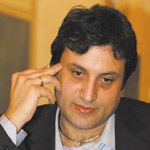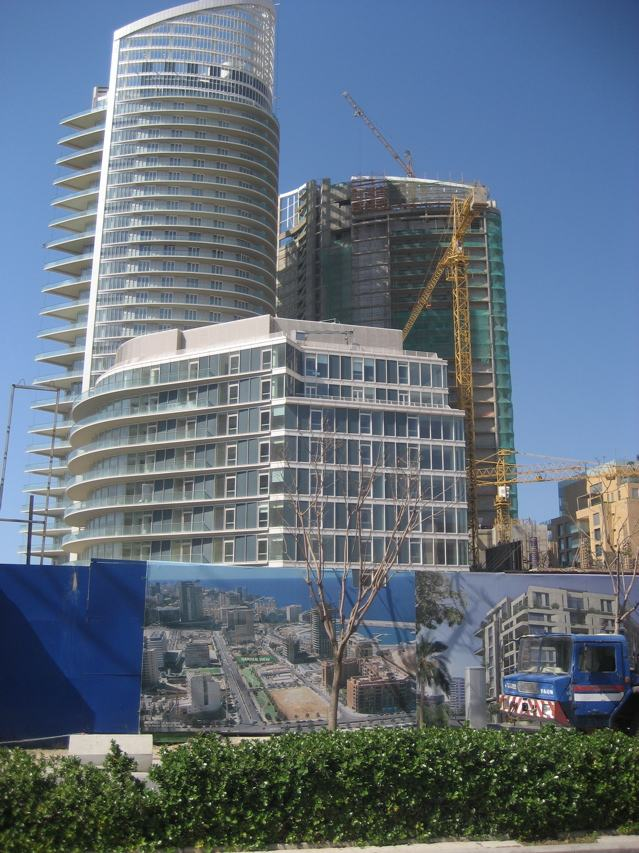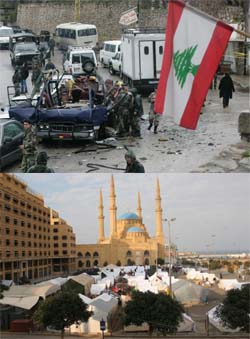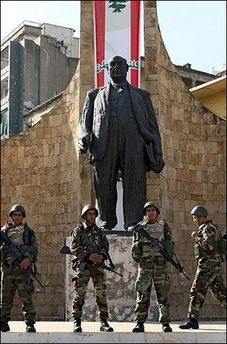 naharnet, Hayek Projects a Little Bad News, a Lot of Good for 2008
naharnet, Hayek Projects a Little Bad News, a Lot of Good for 2008
Michel Hayek, Lebanon's most famous psychic, predicted that the year 2008 will generally bring good news, but warned of some bad news.
Hayek said obstacles that faced the election of a new president for Lebanon will "soon disappear," but warned that a "spell" will continue to prevail at the Baabda Palace and its environs. He did not elaborate.
He predicted that the next 18 months will be influenced by prosperous banking system, new investments, building of dams and tourist projects along the Lebanese coast.
Hayek, however, warned that the Lebanese Forces as well as its leader Samir Geagea will be targeted in 2008.
He also pointed to "negative intentions" against Lebanese Forces MP Antoine Zahra and former MP Faris Soeid.
Hayek predicted that Free Patriotic Movement leader Gen. Michel Aoun and a number of his aides will be subject to "vicious operations." He did not reveal the nature of these actions.
Politically, Hayek spoke about historic hand-shakings that could bridge the gap among some Lebanese figures.
Hayek expected Hizbullah to achieve an additional success in swapping prisoners with Israel, though at a "high cost."
 A country going through crazy times, it should have come as no surprise that Lebanon's real estate prices doubled. "It's completely ridiculous and against all forecasts of a difficult political situation. No one wants to sell at normal rates, everyone has now doubled their price," said Patrick Geammal, chairman and managing director of ASCOT. Whether real or imagined, such predictions have made their mark on sellers' expectations and deals have stalled.
A country going through crazy times, it should have come as no surprise that Lebanon's real estate prices doubled. "It's completely ridiculous and against all forecasts of a difficult political situation. No one wants to sell at normal rates, everyone has now doubled their price," said Patrick Geammal, chairman and managing director of ASCOT. Whether real or imagined, such predictions have made their mark on sellers' expectations and deals have stalled.
"If before the price of land was $2,000, they now want $4,000, but if you are willing to pay $4,000, they want $8,000," Geammal laughed.
Guillaume Boudisseau of Ramco Real Estate Advisors said he faced the same problem but believed that sellers cannot dictate prices. "They just don't understand that they can't set their own price," he said, adding that, "it's mathematically based on the value of surrounding land."
Land scarcity is also a factor in pricing. In prime locations such as Ashrafieh, Hamra, Verdun, and Ramlet al-Baida, plots of land could be found two years ago. Today, however, there are only a few remaining plots, which is putting pressure on prices. "So those that held on to their lands are now asking ridiculous prices and making the market grow," said Geammal.
Prices have increased by 20% since March, prior to the clairvoyant's prediction. "Growth is everywhere," said Nabil Gebrael, chairman of Caldwell Banker. He further stated prices only plateau during tough times for the market and resume to a steady increase once the market returns to normal. This phenomenon is due to two important factors: First, Beirut as a capital city is still inexpensive per square-meter compared to neighboring capitals such as Damascus and Amman. Second, building materials -- steel, concrete, tiles, and fixtures -- have increased due to the declining dollar against the euro. "In Lebanon, real estate is determined by cost, not market demand," insisted Gebrael. Bank Audi reported that the Construction Cost Index from end-2006 to end-June 2007 increased by 9.4%.
Multiple attempts failed to resolve stalemate between rival politicians, By Hani M. Bathish, Daily Star,
 BEIRUT: Politically, 2007 was a year of intense activity in Lebanon, but with few tangible results. It was a year of looming constitutional vacuums, incessant political bickering, and near total legislative inertia, as the doors of Parliament remained shut, and the country was left without a head of state, just a Cabinet whose own legitimacy was questioned. An encampment of opposition supporters in Downtown Beirut laying siege to what they saw as the ruling coalition's "monopoly on power" is what many will remember of the past year. What began as a resignation of opposition ministers in protest over the path the government was taking snow-balled into a major political crisis as 2006 came to a close. Little did anyone know that the sit-in near the Grand Serail would last for more than a year.
BEIRUT: Politically, 2007 was a year of intense activity in Lebanon, but with few tangible results. It was a year of looming constitutional vacuums, incessant political bickering, and near total legislative inertia, as the doors of Parliament remained shut, and the country was left without a head of state, just a Cabinet whose own legitimacy was questioned. An encampment of opposition supporters in Downtown Beirut laying siege to what they saw as the ruling coalition's "monopoly on power" is what many will remember of the past year. What began as a resignation of opposition ministers in protest over the path the government was taking snow-balled into a major political crisis as 2006 came to a close. Little did anyone know that the sit-in near the Grand Serail would last for more than a year.
The start of the year also saw an economic reform plan unveiled to cut public debt and revitalize the crippled economy. The opposition viewed the plan as a new edifice of the hated government to tear down. Each component of the plan was met with outright rejection by the opposition and protest rallies led by the opposition-aligned General Labor Confederation.
The logjam persisted right up to and beyond the end of former President Emile Lahoud's term on November 23. Throughout the year, the governing coalition and the opposition traded accusations, recriminations and even expletives. It was a year of crisis milestones, from the ratification of the UN Special Tribunal for Lebanon to try suspects in the slaying of former Premier Rafik Hariri, to disagreement over a consensus presidential candidate and the distribution of Cabinet posts in a new government.
The Council of Maronite Bishops warned early in the year that the situation had become "unstable" and that "Lebanon's salvation should emanate from inside the country not from outside it." The warning went unheeded as old demons from the 1975-90 Civil War were roused.
 By Robert F Worth, Lebanon may seem an unlikely holiday spot: the government has collapsed, car bombs go off periodically and foreign envoys warn of an impending civil war.And yet, so many people have been streaming into this tiny, embattled country in recent days that the flights are all overbooked, and some well-heeled travelers are driving 18 hours from the Persian Gulf. Beirut's restaurants, bars and malls are all packed with revelers.
By Robert F Worth, Lebanon may seem an unlikely holiday spot: the government has collapsed, car bombs go off periodically and foreign envoys warn of an impending civil war.And yet, so many people have been streaming into this tiny, embattled country in recent days that the flights are all overbooked, and some well-heeled travelers are driving 18 hours from the Persian Gulf. Beirut's restaurants, bars and malls are all packed with revelers.
Why? The answer is that the Lebanese diaspora reverses itself on holidays, as the migrants who sustain the war-shattered Lebanese economy all year return from jobs across the globe to spend time with their families. Nothing will deter them
Khazen History


Historical Feature:
Churches and Monasteries of the Khazen family

St. Anthony of Padua Church in Ballouneh
Mar Abda Church in Bakaatit Kanaan
Saint Michael Church in Bkaatouta
Saint Therese Church in Qolayaat
Saint Simeon Stylites (مار سمعان العامودي) Church In Ajaltoun
Virgin Mary Church (سيدة المعونات) in Sheilé
Assumption of Mary Church in Ballouneh
1 - The sword of the Maronite Prince
2 - LES KHAZEN CONSULS DE FRANCE
3 - LES MARONITES & LES KHAZEN
4 - LES MAAN & LES KHAZEN
5 - ORIGINE DE LA FAMILLE
Population Movements to Keserwan - The Khazens and The Maans
ما جاء عن الثورة في المقاطعة الكسروانية
ثورة أهالي كسروان على المشايخ الخوازنة وأسبابها
Origins of the "Prince of Maronite" Title
Growing diversity: the Khazin sheiks and the clergy in the first decades of the 18th century
Historical Members:
Barbar Beik El Khazen [English]
Patriach Toubia Kaiss El Khazen(Biography & Life Part1 Part2) (Arabic)
Patriach Youssef Dargham El Khazen (Cont'd)
Cheikh Bishara Jafal El Khazen
Patriarch Youssef Raji El Khazen
The Martyrs Cheikh Philippe & Cheikh Farid El Khazen
Cheikh Nawfal El Khazen (Consul De France)
Cheikh Hossun El Khazen (Consul De France)
Cheikh Abou-Nawfal El Khazen (Consul De France)
Cheikh Francis Abee Nader & his son Yousef
Cheikh Abou-Kanso El Khazen (Consul De France)
Cheikh Abou Nader El Khazen
Cheikh Chafic El Khazen
Cheikh Keserwan El Khazen
Cheikh Serhal El Khazen [English]
Cheikh Rafiq El Khazen [English]
Cheikh Hanna El Khazen
Cheikha Arzi El Khazen
Marie El Khazen